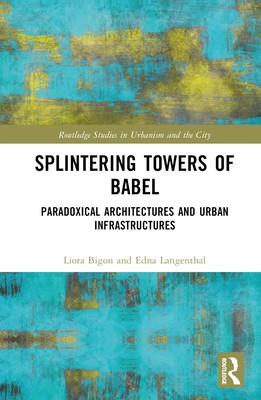
- We will send in 10–14 business days.
- Author: Liora Bigon
- Publisher: Routledge
- ISBN-10: 1032527978
- ISBN-13: 9781032527970
- Format: 15.6 x 23.4 x 1.4 cm, kieti viršeliai
- Language: English
- SAVE -10% with code: EXTRA
Reviews
Description
Splintering Towers of Babel focuses on, and redefines, soft infrastructures and critical infrastructure projects. It explores key and issues in contemporary urban studies including town planning histories, architecture, heritage, colonialism and postcolonialism, philosophy and ethics.
The book combines transdisciplinary perspectives on the key historical, philosophical, and political issues associated with urban experiences, built forms and infrastructure networks. It explores uneven dimensions in contemporary urbanisms and develops spatial phenomenological thinking with reference to the northern and southern hemispheres. This book connects the past and the present, in addition to Western and global South geographies, with a focus on Sub-Saharan Africa. Its main contribution is to broaden readers understanding of infrastructure through the lens of the humanities, and to engage with political, poetical, and ethical perspectives.
This book is tailored to scholars working in the fields of urban planning, urban geography, architectural history, urban design, infrastructure studies, colonial and postcolonial studies, African studies, and philosophy.
EXTRA 10 % discount with code: EXTRA
The promotion ends in 23d.09:20:16
The discount code is valid when purchasing from 10 €. Discounts do not stack.
- Author: Liora Bigon
- Publisher: Routledge
- ISBN-10: 1032527978
- ISBN-13: 9781032527970
- Format: 15.6 x 23.4 x 1.4 cm, kieti viršeliai
- Language: English English
Splintering Towers of Babel focuses on, and redefines, soft infrastructures and critical infrastructure projects. It explores key and issues in contemporary urban studies including town planning histories, architecture, heritage, colonialism and postcolonialism, philosophy and ethics.
The book combines transdisciplinary perspectives on the key historical, philosophical, and political issues associated with urban experiences, built forms and infrastructure networks. It explores uneven dimensions in contemporary urbanisms and develops spatial phenomenological thinking with reference to the northern and southern hemispheres. This book connects the past and the present, in addition to Western and global South geographies, with a focus on Sub-Saharan Africa. Its main contribution is to broaden readers understanding of infrastructure through the lens of the humanities, and to engage with political, poetical, and ethical perspectives.
This book is tailored to scholars working in the fields of urban planning, urban geography, architectural history, urban design, infrastructure studies, colonial and postcolonial studies, African studies, and philosophy.


Reviews